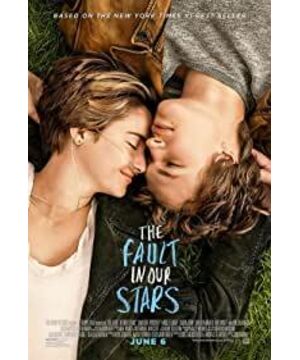Every gentle movie starts with clear music. With the heroine's brisk tone, it seems so casual to fall from ideal to reality, "This is the truth".
Romain Rolland once said, "The real hero is the one who recognizes life for what it is but still loves it." This is a journey of recognizing the truth, accepting the truth, and still being gentle.
I always feel that the name of each movie character has its own meaning. The name of the heroine Hazel means hazel and hazelnut in English, while the name of the hero Augustus is the same name as Octavian, the first emperor of the Roman Empire. This also indicates the difference in character and values between the two. Hazel is like a light-hearted chestnut, who only wants to have the one-hearted person, but Augustus hopes to not be forgotten by the world and make some achievements. Although the hard-to-ignore background is that both of them are cancer patients, I watched this movie as a love and family movie, it's about how these two different people fall in love, how they work together, how they accept each other, A documentary about how to influence and depend on each other, and how to leave gently in the end. It does not describe the patient's grief, but understanding and integration, not only for loved ones, but also for relatives, friends and the world.
One of the most repeated scenes in the movie is when Hazel was in the ICU when she was 15 years old, and was about to leave. In a vague sense, her mother said, "You can leave." This recall scene was only filmed in the first two appearances. Here, and after the third appearance, followed by her mother after saying this, falling into her father's arms and saying "I'm not a mother anymore." This has been a knot in Hazel's heart until the end of the film. At the end of the day, Hazel insisted on skipping meals and going out, and after a quarrel with her mother, the knot was unraveled. The memories mentioned these four times are full of flavors and layers upon layers. They contain hatred for cancer, the mother’s love for choosing to let her daughter leave quickly and prefer to bear the pain alone, and the eternal life in the shadows for her mother. The guilt, the fear and despair of the lightness of life, but just like Pandora's Box, there is finally another continuation of hope for the future, all of which are released in Hazel's tender eyes and a hug at the end.
I once watched a documentary saying that when Anita Mui died, no one dared to sign a consent form to remove her ventilator. I can understand this very well. When watching their relatives struggle, few people can say the sentence "you can leave". Everyone knows that after saying that sentence, the rest is endless regret and regret for the rest of their lives. Pain, this is helpless selfishness: no one wants to pick up such a murderous knife, freeing the victim but imprisoning himself. The first level that surprised me was that the mother was willing to do it, the second level that surprised me was that this daughter understood what her mother did, and the third level that surprised me was that this daughter knew that her mother would be imprisoned in endless in the darkness, and was afraid that the mother would do so. This deep meaning, without any trace of the outbreak, is amazing and moving. The disaster brought desperate despair to the family, a breakdown that tried to hide, and a fear that was restrained as much as possible, but beneath these lingering, entangled shadows was an undercurrent of unexpressed love, and this moment's Outbursts make the twisted life accepted so calmly.
Five stars.
View more about The Fault in Our Stars reviews











